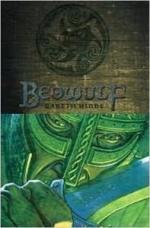[3] For 420 (b) and 421 (a), B. suggests: Þaer ic (on) fifelgeban yethde eotena cyn = where I in the ocean destroyed the eoten-race.—t.B. accepts B.’s “brilliant” ‘fifelgeban,’ omits ‘on,’ emends ‘cyn’ to ‘ham,’ arranging: Þaer ic fifelgeban yethde, eotena ham = where I desolated the ocean, the home of the eotens.—This would be better but for changing ‘cyn’ to ’ham.’—I suggest: Þaer ic fifelgeband (cf. nhd. Bande) yethde, eotena cyn = where I conquered the monster band, the race of the eotens. This makes no change except to read ‘fifel’ for ‘fife.’
[4] ‘Unforhte’ (444) is much disputed.—H.-So. wavers between adj. and adv. Gr. and B. take it as an adv. modifying etan: Will eat the Geats fearlessly.—Kl. considers this reading absurd, and proposes ‘anforhte’ = timid.—Understanding ‘unforhte’ as an adj. has this advantage, viz. that it gives a parallel to ‘Geatena leode’: but to take it as an adv. is more natural. Furthermore, to call the Geats ‘brave’ might, at this point, seem like an implied thrust at the Danes, so long helpless; while to call his own men ‘timid’ would be befouling his own nest.
[5] For ‘head-watch,’ cf. H.-So. notes and cf. v. 2910.—Th. translates: Thou wilt not need my head to hide (i.e., thou wilt have no occasion to bury me, as Grendel will devour me whole).—Simrock imagines a kind of dead-watch.—Dr. H. Wood suggests: Thou wilt not have to bury so much as my head (for Grendel will be a thorough undertaker),—grim humor.
[6] S. proposes a colon after
‘nimeeth’ (l. 447). This would make
no
essential change in the translation.
[7] Owing to the vagueness of ‘feorme’ (451), this passage is variously translated. In our translation, H.-So.’s glossary has been quite closely followed. This agrees substantially with B.’s translation (P. and B. XII. 87). R. translates: Thou needst not take care longer as to the consumption of my dead body. ‘Lic’ is also a crux here, as it may mean living body or dead body.
VIII.
HROTHGAR AND BEOWULF.—Continued.
{Hrothgar responds.}
Hrothgar
discoursed, helm of the Scyldings:
“To
defend our folk and to furnish assistance,[1]
Thou
soughtest us hither, good friend Beowulf.
{Reminiscences of Beowulf’s father, Ecgtheow.}
The
fiercest of feuds thy father engaged in,
5
Heatholaf killed he in hand-to-hand conflict
’Mid
Wilfingish warriors; then the Wederish people
For
fear of a feud were forced to disown him.
Thence
flying he fled to the folk of the South-Danes,
[18] The race of the Scyldings, o’er the
roll of the waters;
10 I had
lately begun then to govern the Danemen,




